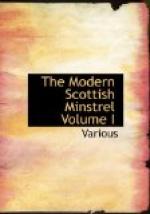The estate of Gask escaped forfeiture, but the father of Carolina did not renounce the Jacobite sentiments of his ancestors. He named the subject of this memoir Carolina, in honour of Prince Charles Edward; and his prevailing topic of conversation was the reiterated expression of his hope that “the king would get his ain.” He would not permit the names of the reigning monarch and his queen to be mentioned in his presence; and when impaired eyesight compelled him to seek the assistance of his family in reading the newspapers, he angrily reproved the reader if the “German lairdie and his leddy” were designated otherwise than by the initial letters, “K. and Q.” This extreme Jacobitism at a period when the crime was scarcely to be dreaded, was reported to George III., who is related to have confessed his respect for a man who had so consistently maintained his political sentiments.
In her youth, Carolina Oliphant was singularly beautiful, and was known in her native district by the poetical designation of “The Flower of Strathearn.” She was as remarkable for the precocity of her intellect, as she was celebrated for the elegance of her person. Descended by her mother from a family which, in one instance,[44] at least, had afforded some evidence of poetical talents, and possessed of a correct musical ear, she very early composed verses for her favourite melodies. To the development of her native genius, her juvenile condition abundantly contributed: the locality of her birthplace, rich in landscape scenery, and associated with family traditions and legends of curious and chivalric adventure, might have been sufficient to promote, in a mind less fertile than her own, sentiments of poesy. In the application of her talents she was influenced by another incentive. A loose ribaldry tainted the songs and ballads which circulated among the peasantry, and she was convinced that the diffusion of a more wholesome minstrelsy would essentially elevate the moral tone of the community. Thus, while still young, she commenced to purify the older melodies, and to compose new songs, which were ultimately destined to occupy an ample share of the national heart. The occasion of an agricultural dinner in the neighbourhood afforded her a fitting opportunity of making trial of her success in the good work which she had begun. To the president of the meeting she sent, anonymously, her verses entitled “The Ploughman;” and the production being publicly read, was received with warm approbation, and was speedily put to music. She was thus encouraged to proceed in her self-imposed task; and to this early period of her life may be ascribed some of her best lyrics. “The Laird o’ Cockpen,” and “The Land o’ the Leal,” at the close of the century, were sung in every district of the kingdom.




